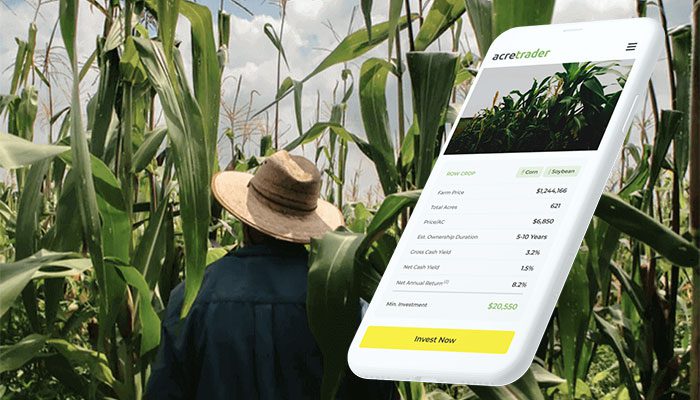As far as we are concerned, land is a woefully underappreciated asset. Nowadays, financial assets, such as stocks, bonds, and electronically traded funds (ETFs), hog the limelight. But a successful and diverse portfolio depends on real assets like real estate, precious metals, commodities, and land.
It’s lack of popularity probably has something to do with accessibility. A whopping 55% of Americans are now in the business of owning stocks, but could the same be said for land, or even real estate at large? Hardly. The “app-ification” of investing is surely behind this staggering preference, for most investing platforms facilitate the purchase of traditional stocks, rather than real assets.
Founded in 2018, AcreTrader is a virtual trading platform trying to change just that. AcreTrader’s claim to fame is its asset class: agricultural farmland. Farmland has unique selling points which differentiate it from both commercial and residential real estate ventures. Plus, there is something soulful about investing in America’s heartland, adding an ethical dimension to what may otherwise be just another vapid cash grab.
Historically, stocks increase in value more quickly than real estate or other real assets. Over long periods of time, an S&P 500 index fund is likely to produce returns in the 9-10% range. On the other hand, real estate numbers barely outpace the rate of inflation. On the bright side, Gallup’s 2020 Economy and Personal Finance survey showed real estate as the most popular investment choice for Americans as of 2013.
Real estate and land certainly have potential, but they also entail a number of pitfalls, hidden fees, and various problems. Often cited are negative cash flows, problematic tenets, bad locations, and structural issues. These features make real estate a more volatile asset than common stocks or bonds.
But AcreTrader eliminates most of these irksome features. As one purchases shares in farms through their platform, you’re not considered a landlord, and so forgo all those pesky details that come with the management of farms. Plus, unlike most farmland investment platforms, AcreTrader offers stunningly low rates.
Let’s take a look at why AcreTrader makes farmland investing so accessible and affordable.
AcreTrader – Expounding Fees
When buying farmland with AcreTrader, you are essentially buying into a stead that is managed and operated by one the company’s project leaders.
These appointed project managers handle everything that a farm requires: things such as the repair of heavy equipment, crop harvesting, the purchase of seed, grain, and soil, and even the collection of rent from tenets.
Most of the fees involved with AcreTrader go toward paying these highly trained professionals. Without their guidance, the farms would surely flounder, and any potential profits along with them. Investors and managers are thus in a state of friendly symbiosis, where a passive income stream is produced by their cooperation.
What Are the Fees?
Generally speaking, most farmland investment platforms charge at least 5% on all assets in order to pay the project managers. This is not criminal; given the historically high return rates that agriculture land provides, most investors are willing to pay the price. Yet, AcreTrader trumps its competitors by offering flat rates of 0.75 – 1% across the board, on all assets. The exact amount depends on the scope of the project you buy into.
There are also no “carries” associated with AcreTrader. Carry charges pertain to insurance, storage, and interest fees attached to the physical commodity which you are investing in. Naturally, this can cut into any profits generated by the land.
In a nutshell, AcreTrader charges some of the lowest rates around.
How About Profits?
This is really the only question that matters, right? Why invest in farmland, a rather obscure asset, when the stock market is thriving and easy money is to be made there?
AcreTrader’s 1% flat rate pertains to all land investments, even those that do not generate a profit. But if history is an indicator, farmland is profitable. According to AcreTrader’s website, users can expect to make anywhere from 9%-11% in profits per year. This would offset any costs associated with the platform.
Profits are generated through the general value increase of the land you buy into, annual rents paid by the tenets working the land, and crop profits.
Nevertheless, we consider farmland investing a long-term asset, meaning that you can’t expect lightning-fast profits. Rather, to see any considerable surplus, you need to wait at least five years for the investment to mature.
The Bottom Line – Should YOU Invest in Farmland?
If you are curious about farmland as an asset, and want to diversify your portfolio with something different, definitely check out AcreTrader. With some of the lowest fees around, and a streamlined application that compares to the best of modern robo-advisors, it may be the best farmland investment venture around.
There is really one caveat: AcreTrader is currently only open to accredited investors. But rest assured, for AcreTrader plans to open their doors to everyone in the near future.



































